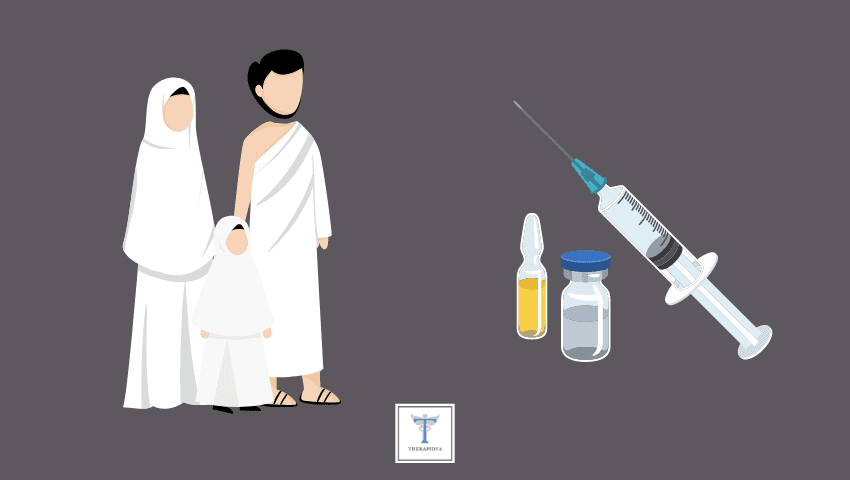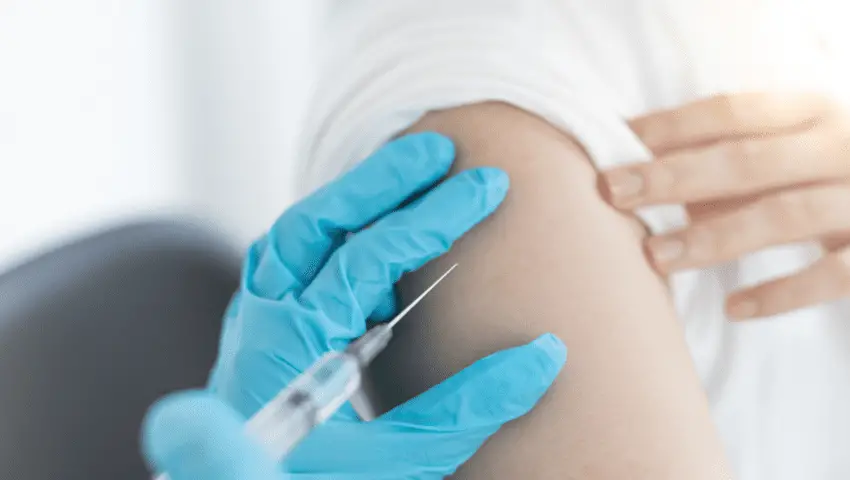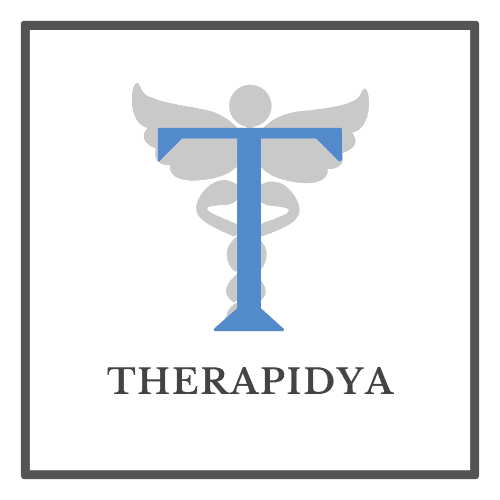Recommended Vaccines and Medications for Hajj .. 2023
We as Therapidya prepared a list of recommended vaccines and medications for Hajj. The Hajj season is one of the biggest seasons in the world in which people gather from all sides, their hearts attached to good deeds, and the performance of Hajj rituals to the fullest.
Therefore, many other things may be neglected, in the midst of the greatest concern, which is the performance of the rites of Hajj. One of the most important obstacles that pilgrims face on their way. These are health obstacles. Therefore, the Saudi Ministry of Health issues every year a list of health requirements that pilgrims must abide by before and during their arrival in the Holy Land.

Recommended Vaccines and Medications for Hajj
Routine Vaccinations
Make sure your routine immunizations are up to date before each trip.
These vaccines are:
Measles-Rubella-Mumps (MMR), Diphtheria, Tetanus, Pertussis, Chickenpox, Polio and annual flu vaccine.
Also read: Online shopping Saudi Arabia
Measles Vaccine
Make sure you’re immune to measles before you travel, as measles can occur in many countries and there have been outbreaks around the world in recent years.
COVID-19 Vaccine
Make sure you are fully vaccinated for COVID-19 before you travel.
Hepatitis A Vaccine
This vaccine is one of the hajj vaccine requirements and recommended regardless of where you eat or stay in Saudi Arabia, as Hepatitis A can be transmitted through contaminated water or food.
Typhoid Vaccine
In Saudi Arabia, typhoid can be transmitted through contaminated food or water. This vaccine can be recommended for travelers and food travelers who will be visiting small cities or rural areas, living in the home of friends or relatives, in endemic areas with a high risk of typhoid fever, especially if they stay longer than 1 month.

Hepatitis B Vaccine
Hepatitis B is transmitted through contaminated needles, blood products, and sexual contact. Therefore, if you are going to have any medical procedure, tattoo or piercing, it is recommended that you get vaccinated if there is a possibility of sexual contact with a new partner.
Rabies Vaccine
Rabies is usually found in dogs but can also be found in other mammals. In the event of a bite or scratch, rabies treatment is usually available in the country. Vaccination may be considered for the following travelers who are more likely to encounter rabid animals:
- Campers, adventure travelers or cave explorers who will engage in outdoor activities and other activities that pose a risk of being bitten or scratched by animals,
- Veterinarians, animal handlers, field biologists or laboratory workers dealing with animals and specimens
- Visitors to rural areas
- Rabies vaccination may be considered for children who are more likely to be bitten or scratched by animals, as they tend to play with animals, cannot express that they have been bitten, and may have more head and neck bites.
Meningitis Vaccine
Passengers must document that they have been vaccinated with the quadrivalent (A/C/Y/W-135) meningococcal meningitis vaccine (meningitis vaccine for hajj) 10 days or more prior to travel.
Yellow Fever Vaccine
Country entry requirement: Passengers aged 1 year and older who come from a country with yellow fever disease and whose transit transit through the airport of a country with yellow fever disease takes more than 12 hours is required an International Certificate of Vaccination showing that they have been vaccinated with the Yellow Fever vaccine.
WHO yellow fever vaccination recommendation: None.
Meningococcal Meningitis Vaccine
Adults and children over 2 years of age arriving for seasonal work in Umrah, Hajj or Hajj sites must present a valid certificate of vaccination showing they have been vaccinated with a quadrivalent (ACYW) meningococcal vaccine administered at least 10 days prior to their planned arrival in Saudi Arabia.
It is considered to be vaccinated with ONE of the following vaccines:
• Quadrivalent (ACYW) polysaccharide vaccine in the last 3 years.
• Quadrivalent (ACYW) conjugate vaccine within the last 5 years.
Current scientific evidence indicates that conjugate vaccines are safe and effective for those over 55. Health authorities in pilgrims’ countries should ensure that their pilgrims are vaccinated within the required validity period and that the type of vaccine is clearly indicated on the vaccination certificate. If the vaccine type is not specified in the certificate, the certificate will be valid for 3 years.
Vaccination with the Quadrivalent (ACYW) conjugate vaccine is also required for the following conditions:
• Local pilgrims.
• Residents of the two holy cities (Mecca and Medina).
• Any person and other authorities who may come into contact with the pilgrims, including staff in healthcare facilities.
The Ministry of Health of Saudi Arabia may choose to provide prophylactic antibiotics at points of entry for some travelers if deemed necessary.
Polio Vaccine
Travelers arriving from areas with active poliovirus transmission (i.e. those with active transmission of a wild or vaccine-derived poliovirus) and from countries at risk of polio reinfection are required to provide a valid polio vaccination certificate.
Travelers from Afghanistan, Democratic Republic of Congo, Mozambique, Myanmar, Niger, Nigeria, Pakistan, Papua New Guinea, Syria, Somalia and Yemen must prove they have been vaccinated with at least one of the following vaccines:
• At least one dose of bivalent oral polio vaccine (OPV) administered within the last 12 months and at least 4 weeks prior to arrival, or
• At least one dose of inactivated polio vaccine (IPV) administered within the last 12 months and at least 4 weeks prior to arrival.
Passengers arriving from Afghanistan, Myanmar, Nigeria, Pakistan, Papua New Guinea, the Syrian Arab Republic, Somalia and Yemen will also receive a dose of OPV at the border entry points to Saudi Arabia.
Malaria
The country is in the pre-elimination stage for malaria. Local contamination is reported only in the Yemen border villages (except the high altitude areas of Asir province), mainly due to P. falciparum, especially between September and January. The infection rate has been reduced to less than 0.3 cases per 100,000 people. There is no risk in the cities of Mecca and Medina.
Recommended Medications for Hajj
In addition to measures against mosquito bites, if P. falciparum-induced malaria risk areas are to be visited ;
- Meflokin 250mg tablet weekly (start 1 week before travel to take 1x250mg tablet per week, continue for 4 more weeks during and after travel) or
- Atovaquone/Proguanil tablet is started 1-2 days before the trip, as 250/100mg once a day . It is continued for 1 week during the trip and after returning, or
- Doxycycline 100mg capsule daily (start 1 day before travel to take 1x100mg tablet daily, continue for 4 weeks during and after travel).
Note: Medicines must be used with the advice of a physician.
This post is also available in: Dansk (Danish) Nederlands (Dutch) Français (French) Deutsch (German) עברית (Hebrew) Italiano (Italian) Polski (Polish) Română (Romanian) Русский (Russian) Türkçe (Turkish) Español (Spanish) Български (Bulgarian)





